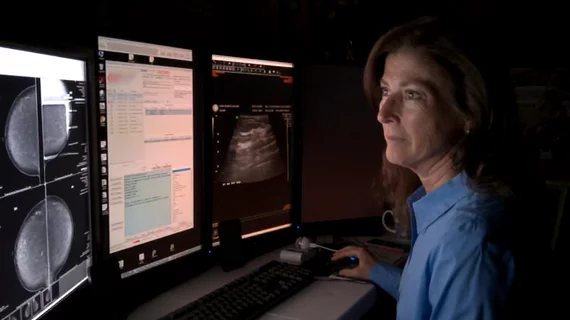USPSTF disappoints on mammography guidance, ACR and SBI respond
The United States Preventive Services Task Force (USPSTF) announced its newest draft breast cancer screening recommendations Monday, once again sparking controversy by giving biennial mammograms for women ages 50 to 74 a “B” grade.
ACA mandates that payors cover tests that receive a “B” grade or higher from the USPSTF; those receiving a “C”—including mammograms for women ages 40 to 49 or annual mammograms for women ages 50 to 74—could potentially not be covered by insurers.
The USPSTF left the decision to screen between ages 40 and 49 up to women and their physicians. “The decision to start screening mammography in women prior to age 50 years should be an individual one,” the USPSTF statement said. “Women who place a higher value on the potential benefit than the potential harms may choose to begin biennial screening between the ages of 40 and 49 years.”
The USPSTF lists potential harms as overdiagnosis, false-positive results and false reassurance from false-negative tests. It also states that “women with a parent, sibling, or child with breast cancer may benefit more than average-risk women from beginning screening between the ages of 40 and 49 years,” but such instances would still ultimate receive a “C” grade as opposed to a “B.”
The ACR and Society of Breast Imaging (SBI) were quick to release a joint statement about these newest recommendations, warning that following them “would result in thousands of additional and unnecessary breast cancer deaths each year.”
Bibb Allen, MD, FACR, chair of the ACR Board of Chancellors, said in the statement that he would like to hear a response to these recommendations from HHS Secretary Sylvia Mathews Burwell.
“We believe that the Secretary of the U.S. Department of Health and Human Services (HHS) can clarify now whether adoption of these USPSTF recommendations would mean that private insurers no longer have to cover mammograms for millions of women 40-49 who, together with their doctor, choose to have regular mammograms and those 50-74 who choose to be screened annually. We call on her to affirm that coverage will not be affected,” Allen said.
The ACR and SBI’s statement also expressed concern that the suggested recommendations “may particularly impact underserved and rural areas.” Barbara Monsees, MD, chair of ACR’s breast imaging commission, explained this fear in more detail.
“Many insurers may try to use these recommendations as an excuse to not cover women for mammograms,” she told RadiologyBusiness.com in an e-mail. “State programs are an area that deserves close watching. In addition, if insurers don’t pay for mammograms with no co-pay, the cost can be a barrier for lower income women.”
This type of controversy is not new to the USPSTF. The group’s last round of cancer screening recommendations was released in 2009 and looked almost identical to these latest recommendations. In 2009, it quickly became a hot topic in the healthcare sector, and a study published by the AJR found that the recommendations could cost approximately 6,500 lives a year.
This news all comes right after a recent Health Affairs study estimated that false-positive mammograms and overdiagnosis cost the United States $4 billion a year, resulting in a lot of mainstream media coverage complaining about the figures.
Etta Pisano, MD, said the Health Affairs study did not suggest to her that mammography schedules should change, especially since cancers have been found to be the most aggressive in younger women.

